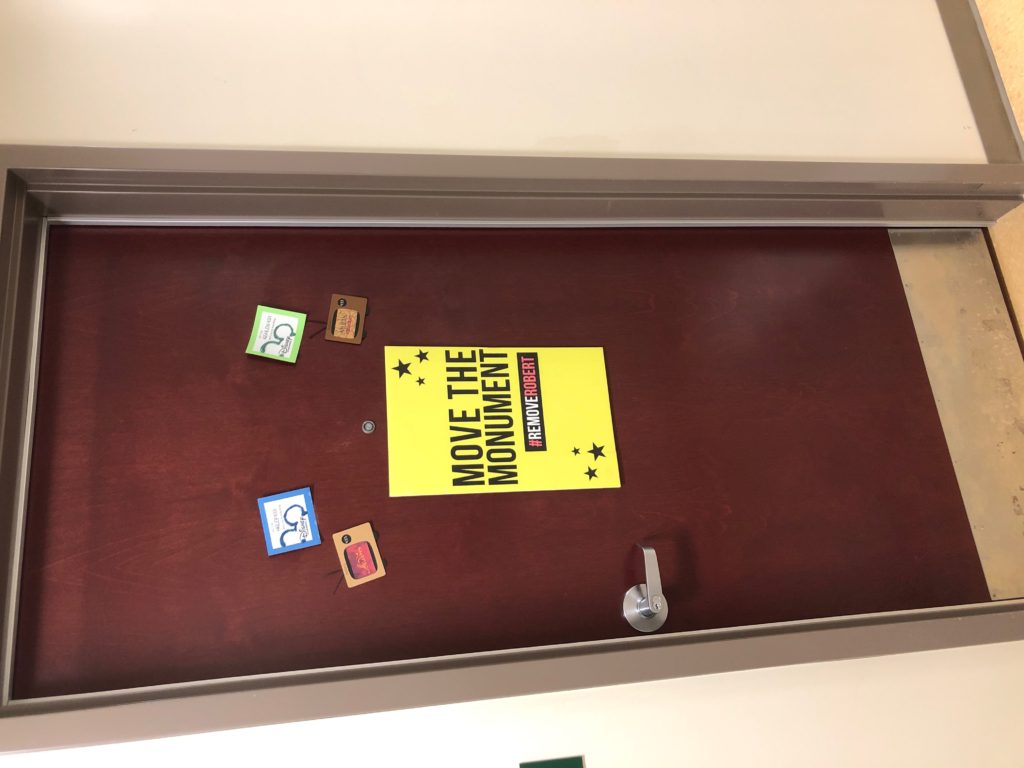Gage Johnson
Editor-in-Chief
gjohnson17@murraystate.edu
Students want to let their voices be heard as the General Election nears, but two students who live in Springer-Franklin Hall on campus feel as if their First Amendment rights are being infringed upon.
As many across the country do, Ashlen Grubbs and a male student who wishes to remain anonymous wanted to show their support for the presidential candidates of their choice with signs in their window and on their doors. However, some complications have come of it.
Grubbs and the other student were told to take down the political signs by residential college personnel because of the negative attention their signs were drawing.
Some students bothered the anonymous student living in Springer-Franklin by covering up his sign or knocking on his window, while Grubbs said the only negative attention has come from university administration ‘constantly pestering’ her about said sign.
Both students feel as though the University is trying to restrict their freedom of speech, especially the male student after he was told that his sign was a safety hazard in case of an emergency or fire where authorities needed to look into the window.
“Yes, I wholeheartedly believe this is infringing on my free speech,” the male student said. “Not trying to get historical but when the constitution was written I believe these are the types of things it was talking about when it comes to free speech. It is not an endangerment to people (ex. shouting fire in a room when there is none) and it is not hate speech, so I just quite do not understand why political signs are an issue.”
In the Murray State Handbook, Housing Regulation five, section seven, expands on the rule for window and exterior door decorations in residential colleges.
“Residents should give consideration to the uniqueness of the university and the diverse population it serves, if the resident chooses to decorate the windows and/or doors of the room,” according to the handbook. “Designs for exterior room doors and windows will have to meet the approval of Housing and Residence Life Departments. Proposed designs should be discussed with and approved in writing by the Residence Director prior to being put on the door or window. Residents must monitor any bulletin boards and white boards they place. The Housing Office will contact the students regarding inappropriate objects or decorations in the windows or on doors facing hallways or public areas. Unapproved items are subject to removal and confiscation.”
In regards to hanging objects, the handbook states that the University reserves the right to remove, or have removed, any foreign object, attached in any way to the inside or outside of any residential college room door or window, that is a potential safety and/or maintenance hazard or is deemed harmful/detrimental to the community environment in the residential colleges and College Courts.
Director of Communications Shawn Touney said the colleges and University alike have implemented rules and regulations like the aforementioned policies and that each instance is different when it comes to decorations on campus.
“A customary practice for years, politically-affiliated signs are not allowed in windows and this is consistent with many peer institutions,” Tourney said. “Decorations associated with the holidays have been allowed, as well as door decorations. Students will be contacted by the Office of Student Affairs or the Housing Office if there is a policy violation. The University will not comment on matters of individual conduct.”
Despite these rules, the male student still feels as though his opinion is being silenced by the University.
“I really can’t say I am in agreement with the University for making me take them down,” the male student said. “Colleges, especially public universities, are supposed to be culturally inclusive. So with that thought, it just makes me feel as if Murray is being kind of subjective to certain things or ideas. I have lived in the residential colleges for almost two and a half years and I have never seen this be an issue for anything placed in windows. Hence, that is why students have had issues with the decision made during such an important year.”
Grubbs agrees that the University is putting a damper on free speech, stating that she should be able to voice her opinion at her “second home.”
“It’s important to be able to express our opinions because the residential side of campus is our house,” Grubbs said. “It’s our little slice of Murray and being able to make it our own makes it feel more like a home.”
After much deliberation Grubbs was able to get her sign cleared to be put back up.
“It was upsetting to be forced to take the sign out of my window, but after bringing attention to the lack of a clear code of decoration conduct, they finally let me keep the sign on my door,” Grubbs said. “But I had to reach out to higher-up administration to get the issue resolved, who never even followed up with me, but rather dropped the issue to avoid bringing attention to their unfair treatment. It’s mostly been incredibly frustrating having to combat the campus administration for equal treatment regarding my decorations.”
The male student, however, did not have the same luck and is upset that he can’t express his opinion, especially in an election year.
“Being able to have door decorations or political signs is another way of expressing one’s self,” the male student said. “With this being an election year, I personally feel as if it is important for students to share views regarding certain topics that are relevant to today’s society. All across the town of Murray or even the county as a whole, you can see signs about certain topics, so I see no difference in myself or others having the same things placed in the dorms.”
For further information regarding Murray State policies and decorations on campus, you can visit the handbook at https://www.murraystate.edu/headermenu/administration/StudentAffairs/policies.aspx.




























































































